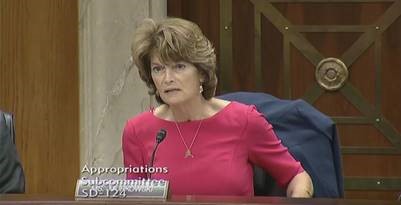Murkowski Questions EPA Administrator Pruitt on Budget Priorities
Clean Air, Clean Water
U.S. Senator Lisa Murkowski (R-AK) chaired an Interior, Environment, and Related Agencies Appropriations Subcommittee hearing on the Environmental Protection Agency’s (EPA) budget proposal for Fiscal Year 2018. During the hearing, Murkowski questioned EPA Administrator Scott Pruitt on numerous priorities for Alaska– ranging from reducing spending at the EPA, mining in the Bristol Bay region, air quality issues in Fairbanks, diesel generator regulations, and efforts to keep our air and water clean.
Murkowski started the hearing by remarking on the core mission and role for the EPA:
“For years, the Agency has overstepped its appropriate role. Rather than focusing on the core mission of cleaning up the environment, the Agency has produced rule after rule using questionable legal authority. Rather than treating states as partners, they were often treated as adversaries simply because they had a different plan to comply with environmental regulatio ns. Administrator Pruitt, you have signaled a desire to refocus the Agency on its core mission, and I support your efforts. We can reduce spending at the EPA and continue our efforts to keep our air and water clean.”
(Click image to watch video of Senator Murkowski’s opening statement.)
Murkowski raised the issue of the need for the EPA to work collaboratively with the Fairbanks North Star Borough to meet air quality requirements, known as particular matter standards (PM 2.5). In fiscal year 2016, Murkowski worked to make the Borough eligible for grants to improve air quality. Murkowski explained the difficulty Fairbanks is facing after it was reclassified from modern to serious non-attainment.
Pruitt responded that his agency is working cohesively with the Alaska Department of Environmental Quality who are committed to finding answers to help improve air quality in Fairbanks in a manner that makes sense. He explained that his agency is working diligently with Alaska to try to achieve positive outcomes and develop a reasonable plan going forward.
Senator Murkowski also questioned Administrator Pruitt about the status of the EPA’s settlement with Pebble Limited Partnership that would allow Pebble to apply for a Clean Water Act permit from the Army Corps regarding a mine proposal in Bristol Bay and advocated for the voice of Alaskans to be heard in the process. Senator Murkowski reiterated that she has been consistently neutral on development in the area, but believes that Pebble should be allowed to apply for a Clean Water Act permit before the EPA preemptively acts to prevent development within the State. Murkowski raised a concern that the public comment period being held during the middle of commercial fishing season doesn’t allow for all relevant stakeholders time to weigh in and asked for a commitment to give enough time to allow local stakeholders to participate.
Administrator Pruitt committed to Senator Murkowski that there will be a sufficient length of time for the comment period – 90 days if necessary – to make sure that Alaskans have time to comment on the proposal.
Furthermore, the Senator questioned Administrator Pruitt on addressing climate change, asking for specific actions the EPA is taking to reduce emissions.
“I come from a state where we talk about the fact that we see our climate has changed. That impact can be seen with ice that is further from the shore, with erosion along the outer coastline and in the interior, and there is a visual impact to the changing climate. Can you speak to some of the common sense parts of the proposal that you feel will have a positive impact on climate?”
Administrator Pruitt emphasized the EPA’s work on combating the negative impacts of climate change – and noted the progress being made by the Agency with mobile sources and technology. Pruitt believes the Agency will continue the progress they are making in respect to reducing the nation’s CO2 footprint.









